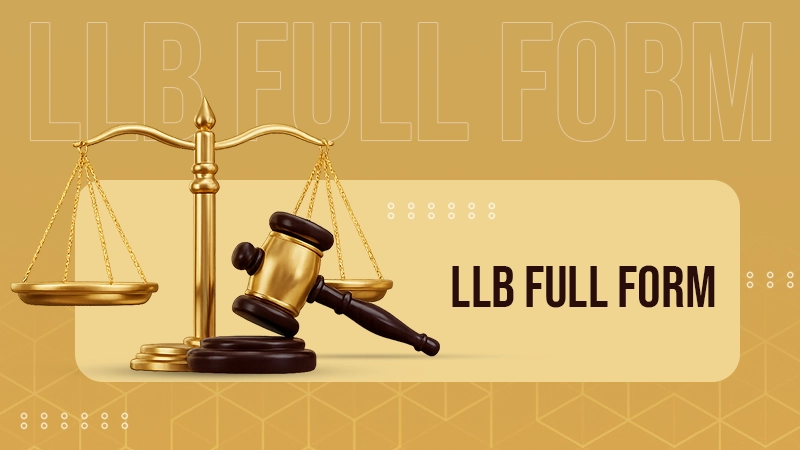
LLB is a prestigious professional course that doesn’t just offer academic opportunities but career stability as well. Students inclined towards critical and analytical thinking must consider the legal profession as their first career choice.
If you need to learn everything about this particular graduation degree, you are in the right place. From the LLB full form, career options, admission process, to much more, everything is discussed below. So, let’s start and dive straight into it.

What is the LLB Full Form?
The LLB full form in Law is Bachelor of Laws. To be precise, this is a Latin abbreviation, which stands for Legum Baccalaureus. In Latin, while doing an abbreviation, the first letter of the plural word is doubled.
In the case of Legum Baccalaureus or Bachelor of Laws, the Laws is in plural, and that is why there is LL. For Bachelor, there is the letter B. Hence, you have LLB. However, you might ask why LLB instead of BLL, as Bachelor comes first.
It is the abbreviation style particularly followed in Latin, which is the language of ancient Rome.
Furthermore, formally speaking, it is LL.B. and not LLB (without any periods or dots). The academically and professionally preferred short form of Bachelor of Laws or Legum Baccalaureus is LL.B. and not the latter. The reason behind this style is the particular standards followed in Latin.
In spoken English, LLB and LL.B. have no difference, and they sound the same. However, for written communication in formal settings, this difference must be well-known. Outside formal context, the use of LLB is also acceptable, as this form is easier and more convenient to spell or type.
Furthermore, LLB is a professional programme or degree. One can pursue LLB right after the 12th class (an integrated law degree) or after graduation (LLB 3 Years). An integrated Law degree typically lasts for 5 years, and it offers multiple options such as BA LLB, BCom LLB, BSc LLB, BTech LLB, etc., as per the stream of a student.
LLB courses can be pursued from various renowned colleges in India.
What is the Difference Between a Lawyer and an Advocate? Is LLB a Lawyer?

Many students don’t know that only completing the law degree doesn’t make them advocates. There is a difference between a lawyer and an advocate.
A lawyer is anyone who holds a law degree in India, while an advocate is someone who also holds a valid licence and is actively practising a specialisation.
For a Licence, every lawyer has to successfully pass the AIBE (All India Bar Examination) and also have to register with the State Bar Council where they plan to practise their profession.
Now, let’s move on to other crucial information about this professional degree/course.
Also Read: From Passion to Profession: How a Higher Education Can Change Your Career
Get a Brief Overview of the LLB Course/Degree
The following table outlines some key features of the Bachelor of Laws or LL.B.
| Course Type | Professional Degree |
| Course Full Name/ LLB Full Form | Bachelor of Laws or Legum Baccalaureus (in short LL.B.) |
| Course Duration | 3 Years (after graduation) or 5 Years (after 10+2) |
| Semesters | 6 (after graduation) and 10 (after 12th) |
| Paper Type | Theory + Practical |
| Subjects | Legislative Enactments or Laws passed by legislatures for example, IPC, Constitution, Contract Act, Code of Criminal Procedure (CrPC), Code of Civil Procedure (CPC), etc. |
| Admission Process | For Govt Colleges: Entrance Test, Cutoff List, or Both |
| For Private Colleges: Passing Marks or Cutoffs (Entrance Test as well for some renowned institutions) |
| Famous Entrance Exam Names | |
| Top Govt. Universities | - Delhi University (DU)
- National Law University Delhi (NLU Delhi)
- Jamia Millia Islamia (JMI)
- Guru Gobind Singh Indraprastha University
- Indian Law Institute
|
| Eligibility Criteria | Bachelor’s Degree or 10+2 |
| Specialisations | Constitutional Law, Family Law, Labour Law, Taxation Law, Intellectual Property Law, Criminal Law, Human Rights, Insurance Laws, Environmental Law, etc. |
| Course Average Fees | Dependent on college (5,000 to 15 Lakhs annually) |
| Job Profiles | Criminal Lawyer, Civil Lawyer, Family Lawyer, Corporate Lawyer, and Legal Advisor |
| Salary Average | 3 LPA to 20 LPA as per competence and other factors |
A little note to consider: Many students or aspirants even use ‘LL.B full form’, but that is not the standard abbreviation either. It can only be used in informal contexts such as Google searches or personal writings, but must never be used in exams and practicals.
Who Can Pursue LLB? (Eligibility Criteria)
There is only a bare minimum that you need to get admitted to a law college. Still, the standard eligibility criteria in general terms are as follows.
- There is no maximum age limit. However, one has to be at least 17 or 18, as it is the age at which students usually pass out of the school system.
- You must have completed your senior secondary schooling, or you are a graduate from any stream.
- The minimum marks required differ from college to college or university to university. Yet, a student must have at least 45% or 50% to be on the safe side.
For further information and specific requirements, one must always check a particular college or university’s website. Sometimes, eligibility criteria differ from university to university. Thus, it is mandatory to check each institution’s website for accurate and specific requirements.
Top Law Entrance Exams
The following are the entrance exams that students have to clear for admission to law programmes at prestigious colleges. Different universities and educational authorities conduct these exams.
Sometimes, only passing a particular entrance test isn’t enough. This is so because, due to competition, a merit list is also issued after the computer-based assessment. Thus, only students with high scores are given chances.
| Law Entrance Exams |
| Common Law Admission Test (CLAT), a national-level law entrance exam |
| DU LLB Entrance Exam, for admission to Delhi University’s law department |
| Law School Admission Test India (LSATI), a national-level law entrance exam |
| Maharashtra Common Entrance Test for Law (MHCET) |
| Common University Entrance Test for Law (CUET) |
| All India Law Entrance Test (AILET) |
| Allahabad University Law Admission Test |
| Indian Law Institute Common Admission Test (ILICAT) |
| University of Petroleum and Energy Studies (UPES) Law School Admission Test (ULSAT) |
| Aligarh Muslim University Law Entrance Exam (AMULEE) |
| Punjab University LLB Entrance Exam |
| Banaras Hindu University BA LLB Entrance Test |
| Law Faculty Admission Test, conducted by Allahabad University |
| Symbiosis Law Admission Test (SLAT) |
| Punjab University UG Law |
| Telangana State Law Common Entrance Test |
| Army Institute of Law Entrance Test |
| ICFAI Law School Admission Test, by the Institute of Chartered Financial Analysts of India |
| Andhra Pradesh Law Common Entrance Test (AP LAWCET) |
Every year, educational institutions offering law conduct entrance exams at different locations. This computer-based evaluation is only organised once a year before the start of a new academic session.
Out of the table, the top entrance exams are CLAT, LSAT, MH CET Law, and AP LAWCET.
Also Read: Top 10 Boarding Schools In India for Admission in 2025-26
Explore the Types of LLB Courses
There are two main types of LLB courses or degrees, namely integrated and non-integrated. When a student takes admission to a law programme after 12th, it is called an integrated law course or degree, which often spans 5 years.
And, if the law is pursued after graduation, it is called an LLB 3 Years or 3-Year LLB. Other facts are as follows.
- An integrated law degree has many options. Suppose you have recently completed your senior secondary education (12th or 10+2) in the arts stream.
- If you aren’t sure about Law right after 12th, you can just pursue a BA for 3 years and then think of doing a law degree separately for 3 years.
- For a student in the commerce stream, there are integrated law degrees as well. If you want to do a BBA (Bachelor of Business Administration) along with Law, you have a BBA LLB course. You can do BCom LLB as well.
- The BBA LLB full form is Bachelor of Business Administration and Bachelor of Laws or Legislative Laws.
Similarly, consider the following types of integrated law degrees.
- BA LLB or Bachelor of Arts and Bachelor of Laws
- BBA LLB or Bachelor of Business Administration and Bachelor of Laws
- B.Com LLB or Bachelor of Commerce and Bachelor of Laws
- B.Sc LLB or Bachelor of Science and Bachelor of Laws
- B.Tech LLB or Bachelor of Technology and Bachelor of Laws
- BCA LLB or Bachelor of Computer Application and Bachelor of Laws
Finally, there is also BLS LLB, which stands for Bachelor of Legal Science and Bachelor of Laws. Students who are super passionate about Law or have fixed their career path right from a young age, pursue this integrated course.
LLB Course Details
LLB course details differ as per the degree type and chosen college. Yet, the following is the general information that you must know about each type of law degree.
| Integrated LLB Courses After 12th Grade or Class |
| Course Type | Details |
| BA LLB | 5-Year Integrated Law Degree after Senior Secondary Schooling |
| BBA LLB | 5-Year Integrated Law Degree after Senior Secondary Schooling |
| BCom LLB | 5-Year Integrated Law Degree after Senior Secondary Schooling |
| BSc LLB | 5-Year Integrated Law Degree after Senior Secondary Schooling |
| BTech LLB | 5-Year Integrated Law Degree after Senior Secondary Schooling |
| BCA LLB | 5-Year Integrated Law Degree after Senior Secondary Schooling |
| BLS LLB | 5-Year Integrated Law Degree after Senior Secondary Schooling |
| LLB 3 Years | 3-Year Law Degree after Graduation |
Eligibility criteria are different from college to college. If you want more details, visit a particular college or university’s website and learn about it as per the integrated course you are interested in. Often, for admission to a private college, you only need passing marks and a 10+2 or graduation statement of marks.
As far as the syllabus is concerned, it is different for each type of integrated course due to the stream difference. You must also search for it specifically from a college prospectus or online portal.
LLB Fee Structure
The fee aspect is very volatile as it totally depends on a particular college. Yet, if you get selected for a government college after successfully passing the entrance test and topping the merit list, the fee will not be very much. It will range approximately 5,000 to 10,000 rupees per year. It can even be lower than that for candidates belonging to the reserved categories.
However, private college fees can reach as high as 18 to 20 lakhs of rupees, starting from a minimum of 2 lakhs. Before taking admission, make sure that you research it very well. The information will help you choose the right college, keeping in mind your financial conditions.
What Salary can you Expect After Pursuing LLB
The salary or income of a person who has completed their law degree differs tremendously according to multiple factors. Yet, your specialisation and experience decide the biggest part of this discussion. A fresher can even earn up to ₹3,00,000 to ₹6,00,000 per annum with exceptional skills.
Furthermore, if you have successfully passed a judicial services exam, your salary as a newly appointed judge or magistrate will be higher than that.
Besides, a government lawyer earns up to 4 to 5 lakhs annually. In short, there is no salary bar for competent students. All you must have is skills, knowledge, and an attitude to learn.
Career Options After LLB
You can consider the following major career paths after completing your legal studies. As there are different domains of law and each one has its own pros and cons. Dedicate yourself to any field, and you will succeed because hard work and consistency are required everywhere.
Advocate

It is the most preferred legal profession after pursuing a law degree. In this option, a person has to help a client go through legal proceedings according to the established standards in a court.
In simple terms, an advocate is a common person’s representative who has to deal with legal matters and present themselves before a judge in a court. For this profession, one has to register with the state bar council and also clear the AIBE (All-India Bar Examination).
Corporate Lawyer

This is a subcategory under the profession of legal advocacy. You can be a corporate lawyer after the completion of a law degree. A corporate lawyer deals with legal affairs pertaining to various operations of a company. Such lawyers have to specialise in company laws such as the Companies Act 2013, Patents Act 1970, Trade Marks Act 1999, etc.
For this path too, one has to first register themselves with the state bar council and then also clear AIBE for a license.
However, if you pursue an LLM degree to specialise in company law, it is an added advantage. If you don’t know the difference between LLB and LLM, the following information is for you.
| Note: LLB is a bachelor’s degree in law, while LLM is a master’s degree. People who want to specialise in any particular branch of law consider an LLM. |
Legal Advisor

Being an advocate, you can also provide consultation for people who need legal guidance to deal with particular legal affairs. An advocate can either start their consultancy firm or join a reputed firm. Many seasoned advocates also take the act of consultancy as a serious source of side income.
Judicial Services
If you are excellent at your legal studies and have a special knack for this field, you can even consider judicial services. By pursuing a career in the Judiciary, you can become a judge or a magistrate.
Like civil services, you have judicial services. You have to prepare for a very competitive exam before you become a judge. Detailed knowledge of this career path is amply available on the internet.
Legal Professor or Lecturer
If you want to be a professor, lecturer, or a teacher of law at the university level, you can pursue a specialisation through an LLM degree and then apply for a doctorate. This way, you can be a professor. It is also a very lucrative and valid career option that fresh law graduates can seriously consider.
Finally, legal journalism or legal writing is also an option. You have to write and cover a wide range of legal affairs. Many people even pursue a journalism degree after an integrated law degree for further specialisation.
Why Pursue an LLB Degree? Future Benefits to Consider
LLB is a very famous and established professional degree for people interested in various types of legal professions. One can choose LLB to be an advocate. There are many types of advocates, as there are multiple subfields to choose from, such as corporate advocates, family advocates, criminal advocates, etc.
Other major reasons to opt for a law degree are as follows.
- To contribute to legal research
- To develop critical and analytical legal thinking
- To improve legal communication skills
- To foster personal growth
- To add a new degree to your degree portfolio
- Higher earning potential
- Diverse career opportunities
- Financial growth and stability
- Recognizing roles and responsibilities
- Opportunities for leadership
Furthermore, if your parents are already in the legal profession, pursuing LLB is a great option. This will help you secure a career option even though you might not be interested in it.
Key Takeaways
The LLB full form is Bachelor of Laws, which is the English Translation of the original Latin expression Legum Baccalaureus. Pursuing a law degree can give you an exceptional edge in the future. If you are a 12th pass-out student, you might ask how to do LLB after 12.
For Govt colleges, you have to clear an entrance exam such as CLAT and then be among the top-scoring candidates to secure a position. However, for a private college, you just need passing marks and should have a stable financial background that can afford the expensive fee structure.
FAQs
Ans: Yes, students from all streams can pursue this degree. You just need to complete your senior secondary education with at least 45 or 50% of marks.
Ans: It is only a two-year specialisation course in any particular legal subfield of choice.
Ans: No. LLM can only be pursued if you have already completed your LLB. Only a law graduate can apply for an LLM course. After the 12th, complete an integrated law degree first, and then you can pursue an LLM degree.